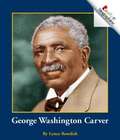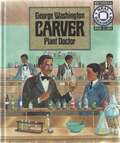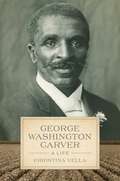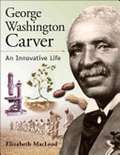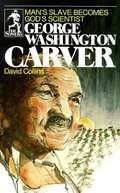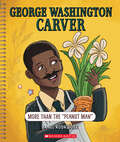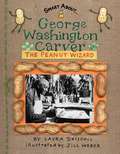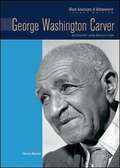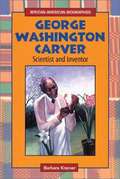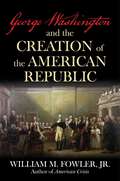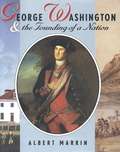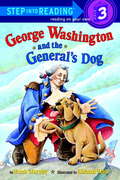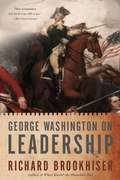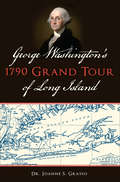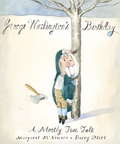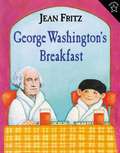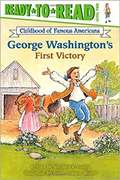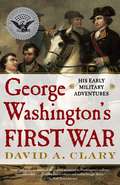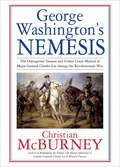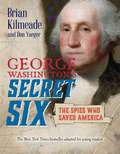- Table View
- List View
George Washington Carver (Rookie Biographies)
by Lynea BowdishAn introduction to the life of the African American scientist who overcame great hardship to make unusual and important discoveries in the field of agriculture.
George Washington Carver for Kids: His Life and Discoveries, with 21 Activities (For Kids series)
by Peggy ThomasGeorge Washington Carver was born into the violent era of slavery, yet he had big ideas. The first was to get an education. That meant leaving his Missouri home at a young age, washing people’s clothes to pay for school, moving from town to town, and fleeing a lynch mob. Carver’s second big idea was to serve others. After becoming the first black graduate from Iowa Agricultural College, Carver took a teaching position at the Tuskegee Institute founded by Booker T. Washington. There he witnessed the miserable conditions of the poor Southern farmer. That’s when his ideas began to flow. Carver taught farmers how to nourish the soil, conserve waste, and feed their families. He developed hundreds of new products from the sweet potato, peanut, and other crops, and his discoveries gained him a place in the national spotlight. Throughout the Jim Crow era, Carver toured America speaking about agriculture, but most people went away with a more important message: that every citizen has hidden potential that, like a seed, just needs nurturing to bloom. Many of Carver’s ideas took a long time to develop, but today his concepts of conservation, zero waste, and plant-based products are on the cutting edge of science. George Washington Carver tells the inspiring story of this remarkable American scientist. It includes a time line, resources for further research, and 21 hands-on activities to better appreciate Carver’s genius.
George Washington Carver, Plant Doctor (Real Readers)
by Mirna BenitezA biography of the agriculturist for beginning readers, chronicling his struggle to get an education, his work at the Tuskegee Institute, and how he helped popularize peanuts as a cash crop in the South.
George Washington Carver: A Life (Southern Biography Series)
by Christina VellaChristina Vella received a PhD. in Modern European and U.S. history from Tulane University, where she is a Visiting Professor. A consultant for the U.S. State Department, she lectures widely on historical and biographical topics.Nearly every American can cite one of the accomplishments of George Washington Carver. A national monument bears his name, a U.S. coin was minted in his honor, and his induction into the National Inventors Hall of Fame is one of many tributes honoring his contributions to scientific advancement and black history. Born into slavery, Carver earned a master’s degree at Iowa State Agricultural College and went on to become the university’s first black faculty member. His research into peanuts and sweet potatoes—crops that replenished the cotton-leached soil of the South—helped lift multitudes of sharecroppers out of poverty. When he died in 1943, despite living during a period of systemic racial prejudice, millions of Americans mourned the passing of one of the nation’s most honored and beloved scientists. Scores of children’s books celebrate the contributions of this prolific botanist, but his personal life, his romantic interests, and the intersection of both with his professional career have remained largely unexamined until now.Christina Vella offers the most thorough biography of George Washington Carver, including in-depth details of his personal relationships with family, colleagues, lovers, and friends, set in the context of the early twentieth century. Despite the exceptional trajectory of his career, Carver was not immune to the racism of the Jim Crow era or the privations and hardships of the Great Depression and two world wars. Yet throughout the tumult of this period, his scientific achievements aligned him with equally extraordinary friends, including Teddy Roosevelt, Mohandas Gandhi, Henry A. Wallace, and Henry Ford.In pursuit of the man behind the historical figure, Vella discovers an unassuming intellectual with a quirky sense of humor, striking eccentricities, and an unwavering religious faith. She explores Carver’s anguished dealings with Booker T. Washington across their nineteen years working together at the Tuskegee Institute—a relationship so fraught with jealousy that it contributed to the tragic suicide of a woman Carver loved. This affair was followed, years later, by Carver’s unrequited passion for a white man.Carver was a prodigious and generous scholar whose life was shaped by struggle and heartbreak as well as success and fame. Vella’s extensively researched biography offers a complex and compelling portrait of Carver, one of the most brilliant minds of the last century.
George Washington Carver: An Innovative Life (Snapshots: Images of People and Places in History)
by Elizabeth MacLeodThis title in the Snapshots: Images of People and Places in History series introduces readers to the scientist, inventor and professor who became a symbol of African American success and interracial harmony. George Washington Carver was the orphan son of slaves, but he went on to become the world-famous Peanut Scientist. <P><P> George invented more than 325 products from peanuts --- including gasoline, shampoo, ice cream and chili sauce. Even when George was a child he was known as the ?Plant Doctor? because he could make almost any plant grow. It was through his groundbreaking research in agriculture that George radically improved the lives of countless African American farmers in the southern United States.
George Washington Carver: Man's Slave Becomes God's Scientist
by David R. Collins Joe Van SeverenGeorge Washington Carver recounts the story of his life and shares his faith and dependence upon his Savior, Jesus Christ.
George Washington Carver: More Than "The Peanut Man" (Bright Minds)
by Janel RodriguezMeet the inventors and scientists of color who changed the world!Born enslaved during the Civil War in Diamond, Missouri, George Washington Carver was an agricultural scientist and inventor. He promoted alternative crops to cotton and methods to prevent soil depletion. Among his many accomplishments, he developed more than 300 industrial and commercial products from peanuts. It is time to remember how George Washington Carver's inventions and his contributions changed our society… and our world!ABOUT THE SERIES:Many inventors and scientists of color have made incredible contributions to our modern life. Each volume in this much-needed new series will be devoted to the life and work of one of these inventors and scientists. With a vivid writing style that will use humor as one of its primary ingredients, and illustrated with a combination of real photos and pictures featuring graphic art, each title in this series will describe how these heroes of diverse backgrounds faced the challenges of their times, and how their inventions and contributions changed our society.
George Washington Carver: Peanut Wizard
by Laura DriscollIntroducing Smart About Scientists! These books feature fascinating biographical information about the world's greatest scientists, ideas on scientific thinking, and real science experiments kids can try at home. Annie Marcus is just nuts about peanut butter! When Annie finds out that George Washington Carver was responsible for the popularity of peanuts, she picks him for her scientist report. Annie learns all sorts of fascinating info-George Washington Carver was born into slavery, but his dedication and unquenchable thirst for knowledge drove him to become a professor at a time when most institutions of higher learning were closed to blacks. This title explores Carver's brilliant career and discoveries, as well as his triumph over segregation to become one of the world's most renowned plant experts.
George Washington Carver: Scientist
by Lois P. NicholsonPart of the acclaimed Junior World Biographies series designed especially for younger readers. Here are the life stories of notable African-American men & women presented in an informative & easy-to-read format. Based on the highly praised Black Americans of Achievement series.
George Washington Carver: Scientist and Educator (Black Americans of Achievement--Legacy Edition)
by Dennis AbramsGeorge Washington Carver has long been revered for his contributions to improving the lives of poor Southern farmers. Carver studied to be a scientist at a time when many black Americans could not afford, or were turned away from, universities. He went on to teach and do research at the famed Tuskegee Institute in Alabama, where he became one of the most popular instructors at the school. Carver's efforts have been mythologized, but there is much to learn about his work, which benefited many people. George Washington Carver: Scientist and Educator tells the true story of the man who became a legend in his field.
George Washington Carver: Scientist and Inventor
by Barbara KramerProfiles the dynamic man who began life as a slave and became an artist, agriculturist, university professor, and public speaker who addressed the House Ways and Means Committee on the issue of import tariffs in 1921.
George Washington Williams: A Biography
by John Hope FranklinThis book traces Franklin's forty-year quest for Williams's story, a story largely lost to history until this volume was first published in 1985. The result, part biography and part social history, is a unique consideration of a pioneering historian by his most distinguished successor. Williams (1849-1891), had a remarkable career as soldier, minister, journalist, lawyer, politician, freelance diplomat, and African traveler, as well as a historian. While Franklin reveals the accomplishments of this neglected figure and emphasizes the racism that curtailed Williams's many talents, he also highlights the personal weaknesses that damaged Williams's relationships and career.
George Washington and the American Revolution
by Becky GoldA McGraw Hill Reading, Leveled Books about George Washington and the American Revolution.
George Washington and the Creation of the American Republic
by William M. Fowler Jr.George Washington and the Creation of the American Republic debunks the portrayal of George Washington in what is described by historians as the &“Critical Years&” (1781–1789), a time when he was deeply involved in land speculation, western expansion, scientific farming, canal building, political affairs, and family matters—directing the nation toward a strong central government.
George Washington and the Founding of a Nation
by Albert MarrinA fascinating, fast-paced account of our first president's life and times. Albert Marrin examines the "father of our country" from the perspectives of his character, military experience, and also his slaveholding, to assess Washington's role in our history. A born leader with a commanding physique, unwavering self-discipline, and an unconquerable will to succeed, he was also-as Lord Fairfax observed when Washington was only sixteen-"a man who will go to school all his life. " Washington's schools were the rugged country of the French and Indian War, the misery-creating insolvency of the Continental Army, and the agrarian responsibility of his plantation in Mount Vernon. Neither a political theorist nor a firebrand, Washington embodied the virtues of fairness, restraint, and farsightedness that could hold the American colonies together-at least for a while. For, as he said near the end of his life and after two terms as president, "I can clearly foresee that nothing but the rooting out of slavery can perpetuate the existence of our union. "
George Washington and the General's Dog (Step into Reading)
by Richard Walz Frank MurphyBoom! Bang! Guns fire! Cannons roar! George Washington is fighting in the American Revolution. He sees a dog lost on the battlefield. Whose dog is it? How will it find its master? Early readers will be surprised to find out what happens in this little-known true story about America's first president.
George Washington for Kids: His Life and Times with 21 Activities (For Kids series)
by Brandon Marie MillerGeorge Washington comes alive in this fascinating activity book that introduces the leader to whom citizens turned again and again--to lead them through eight long years of war, to guide them as they wrote a new Constitution, and to act as the new nation's first executive leader. Children will learn how, shortly after his death in 1799, people began transforming George Washington from a man into a myth. But Washington was a complex individual who, like everyone, had hopes and fears, successes and failures. In his early 20s, for instance,Washington's actions helped plunge Great Britain and France into war. He later fought for liberty and independence, yet owned slaves himself (eventually freeing them in his will). This book weaves a rich tapestry of Washington's life, allowing kids to connect with his story in 21 hands-on projects based on his experiences and the times in which he lived. Children will learn how to tie a cravat, write with a quill pen, follow animal tracks, sew a lady's cap, plant a garden, roll a beeswax candle, play a game of Quoits, and make a replica of Washington's commander-in-chief flag. The text includes a time line, glossary, websites, travel resources, and a reading list for further study.
George Washington on Leadership
by Richard BrookhiserIn 1799, at the end of George Washington’s long life and illustrious career, the politician Henry Lee eulogized him as: "First in war, first in peace, and first in the hearts of his countrymen. ” Esteemed historian Richard Brookhiser now adds to this list, "First in leadership,” examining the lessons to be learned from our first president, first commander-in-chief, and founding CEO. With wit and skill, Brookhiser expertly anatomizes true leadership with lessons from Washington’s three spectacularly successful careers as an executive: general, president, and tycoon. In every area of endeavor, Washington maximized his strengths and overcame his flaws. Brookhiser shows how one man’s struggles and successes two centuries ago can serve as a model--and an inspiration--for leaders today.
George Washington's 1790 Grand Tour of Long Island
by Dr. Joanne S. GrassoThe story of the first American president’s journey through Brooklyn, Queens, Nassau, and Suffolk, based on his own diary.After being elected president, George Washington set out to tour the new nation, which was desperate for a unifying symbol. He spent five days on Long Island in April 1790, an area recovering from seven years of devastating British occupation. Washington saw it all, from Brooklyn to Patchogue to Setauket and back. He was honored at each stop and wrote extensive diary entries about his impressions of the carriage stops for food and overnight stays at taverns and private homes, as well as his vision for the future of the region. In this book, historian Dr. Joanne S. Grasso traces this momentous journey.Includes maps and illustrations
George Washington's Birthday: A Mostly True Tale
by Margaret Mcnamara Barry BlittFrom award-winning author Margaret McNamara and New Yorker artist Barry Blitt comes this partly true and completely funny story of George Washington's 7th birthday. In this clever approach to history, readers will discover the truths and myths about George Washington. Did George Washington wear a wig? No. Did George Washington cut down a cherry tree? Probably not. Readers young and old who are used to seeing George Washington as an old man, will get a new look at the first president--as a kid. Perfect for classrooms, Presidents' Day, or as a birthday gift.From the Hardcover edition.
George Washington's Breakfast
by Jean FritzGeorge Washington Allen, a boy who never gives up until he finds out what he wants to know, is determined to learn all there is to know about his namesake.
George Washington's First Victory (Ready-To-Read COFA)
by Stephen KrenskyDescribes an incident in the early life of George Washington, which provides a glimpse of his relationship with his mother.
George Washington's First War
by David A. Clary"I heard the bullets whistle, and, believe me, there is something charming in the sound." So said the young George Washington, something no veteran soldier would say. He had not been the target of enemy fire. Instead, he was papering over the fact that his men and Indian allies had just massacred a diplomatic party, setting off the French and Indian War of 1754-63. He had violated international law, something else he would not admit. Washington could, after all, tell a lie. That is but one revelation that acclaimed military historian and Washington expert David A. Clary offers in George Washington's First War. Washington spent his adolescence in military service, starting as a colonel in command at the age of twenty-two. He came from a society without a military tradition, and had no training or battle-wise sergeants to keep him out of trouble. He was a young glory hound thrust into circumstances he was not prepared to handle by elders who should have known better. Leading reluctant amateur soldiers against French professionals, when he took command he was on his own. Accordingly, Washington survived a five-year ordeal unlike that endured by any other Founding Father. He emerged from it not yet the steady supreme commander of the Revolution, but he had started on the road that led him to become the great soldier and statesman of his age. How he began his life's journey is what George Washington's First War is about. It is a dramatic story of frontier warfare played out against the anxieties and resentments of an ambitious adolescent. Here are accounts of harrowing ordeals in the wilderness, the decisive part played by the Indian nations whose continent this was, and the epic clash of empires. Others have looked at Washington's activities during the French and Indian War without recognizing that he played his part in that history during his painful transition from boy to man. His repeated blunders and defeats arose from his youthful impetuosity and inexperience and weak support from his government. Clary has a sound understanding of eighteenth-century wilderness warfare, and his descriptions of battles are vivid, exciting, and laced with horrifying details. Brought to dramatic life are Washington's harrowing wintertime journey into the wilderness to order the French to leave the territory, the Jumonville Massacre, his bloody defeat at Fort Necessity, his heroism at the Battle of the Monongahela (Braddock's Defeat), his years of frustration commanding the Virginia Regiment, the Forbes Expedition of 1758, his insubordination to civil and military superiors, and his resignation from the army. A revealing portrait of Washington during a crucial, formative period of his life, this is the indispensable backstory to the making of a great man.
George Washington's Nemesis: The Outrageous Treason and Unfair Court-Martial of Major General Charles Lee during the Revolutionary War
by Christian McBurneyThis biography attempts to set the record straight for a misunderstood military figure from the American Revolution. Historians and biographers of Charles Lee have treated him as either an enemy of George Washington or a defender of American liberty. Neither approach is accurate; objectivity is required to fully understand the war&’s most complicated general. In George Washington&’s Nemesis, author Christian McBurney uses original documents (some newly discovered) to combine two dramatic stories to create one balanced view of one of the Revolutionary War&’s most fascinating personalities. General Lee, second in command in the Continental Army led by George Washington, was captured by the British in December, 1776. While imprisoned, he gave his captors a plan on how to defeat Washington&’s army as quickly as possible. This extraordinary act of treason was not discovered during his lifetime. Less well known is that throughout his sixteen months of captivity and even after his release, Lee continued communicating with the enemy, offering to help negotiate an end to the rebellion. After Lee rejoined the Continental Army, he was given command of many of its best troops together with orders from Washington to attack British general Henry Clinton&’s column near Monmouth, New Jersey. But things did not go as planned for Lee, leading to his court-martial for not attacking and for retreating in the face of the enemy. McBruney argues the evidence clearly shows Lee was unfairly convicted and had, in fact, done something beneficial. But Lee had insulted Washington, which made the matter a political contest between the army&’s two top generals—only one of whom could prevail.
George Washington's Secret Six (Young Readers Adaptation): The Spies Who Saved America
by Brian Kilmeade Don YaegerA page-turning middle-grade adaptation of the New York Times bestseller about George Washington's top-secret spy ring that helped defeat the British.The American Revolution is well under way in 1776, but things are looking bleak for General George Washington and his Continental Army. With Washington's hasty retreat from New York City in August, many think the war might soon be over. After all: how on earth is this ragtag group going to defeat its enemy, the well-trained and well-funded military of the largest empire in history? But Washington soon realizes he can't win with military might. Instead, he must outsmart the British, so he creates a sophisticated intelligence network: the top-secret Culper Spy Ring. Drawing on extensive research, Brian Kilmeade and Don Yaeger tell the fascinating stories of these long unrecognized spies: a reserved merchant, a tavern keeper, a brash young longshoreman, a curmudgeonly Long Island bachelor, a coffeehouse owner, and a mysterious woman.This vivid and accessible young readers adaptation of the New York Times bestseller features an exclusive new introduction, extensive back matter, and eye-catching art throughout. Chronicling a crucial moment in American history, this historical thriller will excite and inspire the next generation of patriots.
